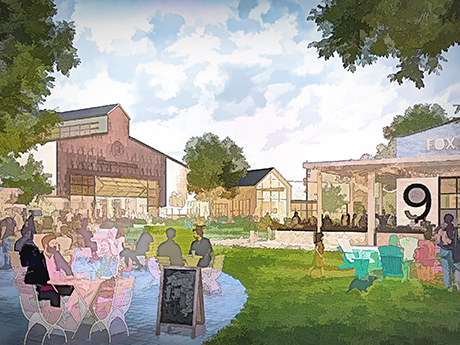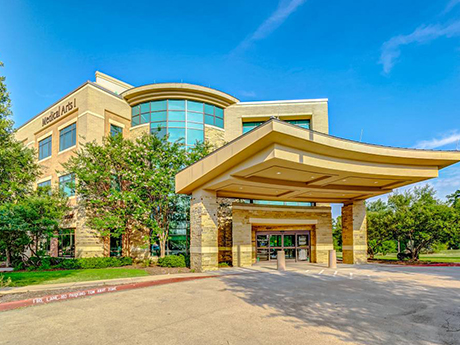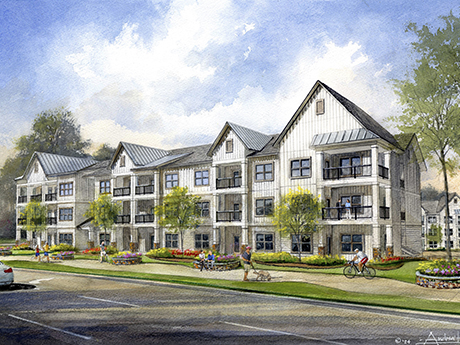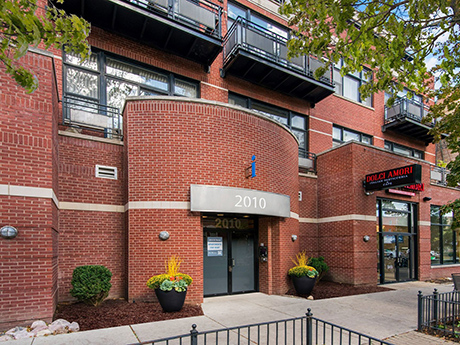NASHVILLE, TENN. — Simon Property Group (NYSE: SPG) plans to develop Sagefield, a 100-acre mixed-use destination that will be located on the south side of Nashville. The construction timeline for the project was not released. Situated in the hills of Williamson County, the planned project will feature lifestyle shops, restaurants and service retail spaces, as well as a landmark hotel by Author & Edit Hospitality, a hotel brand helmed by restaurateur and hotelier Sam Fox of Fox Restaurant Concepts. “This exciting new development will set a new standard for quiet luxury in metro Nashville and beyond,” says Eric Sadi, co-president of Simon’s North American real estate division. Simon is collaborating on Sagefield with Adventurous Journeys Capital Partners (AJ Capital), a Nashville-based firm that specializes in mixed-use and adaptive reuse development. Simon and AJ Capital are currently collaborating on Nashville Premium Outlets, a 325,000-square-foot outlet mall that will break ground next year in Thompson’s Station, Tenn. Plans for Sagefield also call for first-to-market boutique retailers, household-name operators, farm-to-table restaurants and cafés, an organic market, entertainment venues and health and wellness concepts. The development’s planned hotel will offer signature restaurants, a high-end spa, sports and a social members club. Simon says that …
Search results for
"stock"
Atlanta’s commercial office market is at a pivotal moment, caught between signs of stabilization and the lingering effects of a post-pandemic reset. Vacancy remains elevated, absorption is improving and tenant preferences continue to evolve — but fundamentals are beginning to shift as the market adjusts to the new workplace. Signs of a bottom? Hybrid work models, space optimization strategies and cautious expansions have elevated metro Atlanta’s office vacancy rates. Direct vacancy rates surpassed 24 percent for the first time and are hovering near all-time highs. Meanwhile, sublease availabilities have declined over 25 percent from their peak in 2023, and quality space remains difficult to find. The slowing pace of vacancy increases suggests the market may be nearing a turning point after recording negative annual absorption in four of the past five years. Net absorption, a key indicator for overall office sector health, totals negative 438,000 square feet, according to Colliers’ second-quarter 2025 report. While still in the red, this marks a significant improvement over previous years. Recent leasing activity suggests even more positive movement in the second half of the year, indicating that tenant departures are tapering and space givebacks are moderating. Leasing: quality vs. quantity Despite economic headwinds, leasing …
KATY, TEXAS — Partners Real Estate has brokered the sale of a 50,532-square-foot industrial outdoor storage facility in the western Houston suburb of Katy. The site at 29315 Highway Blvd. spans 44.6 acres. Hunter Stockard and Wyatt Huff of Partners represented the seller, BioUrja, in the transaction. The buyer was Chicago-based private equity real estate firm Timber Hill Group.
WILLIAMSBURG, VA. — A joint venture between Kemmons Wilson Hospitality Partners LP and Ascendant Capital Partners LP, doing business jointly as KW Kingfisher LLC, has entered into a definitive merger agreement with Sotherly Hotels Inc. (NASDAQ: SOHO), a hospitality REIT based in Williamsburg. Sotherly owns 10 upscale hotels in the Sun Belt and Mid-Atlantic totaling 2,786 hotel rooms, as well as interests in two condominium hotels and their associated rental programs. Sotherly’s portfolio includes:– The Georgian Terrace in Atlanta– The Whitehall in Houston– The DeSoto in Savannah, Ga.– Lyfe Resort & Residences in Hollywood, Fla.– Hyde Beach House in Hollywood, Fla.– DoubleTree by Hilton Hollywood Beach Resort in Hollywood, Fla.– Hotel Ballast in Wilmington, N.C.– Hotel Alba in Tampa, Fla.– Hyatt Centric Arlington in Arlington, Va.– DoubleTree Jacksonville Riverfront in Jacksonville, Fla.– DoubleTree by Hilton Laurel in Laurel, Md.– DoubleTree by Hilton Philadelphia Airport “This transaction is a testament to the high-quality portfolio that Sotherly has built over the past 20-plus years as a publicly traded company, and we are confident this will pave a path toward future success for our hotels and the associates and guests who enjoy them every day,” says David Folsom, CEO of Sotherly. Under terms …
DALLAS — Locally based investment firm CanTex Capital has sold a portfolio of eight industrial outdoor storage facilities totaling roughly 44 acres that are located across the Dallas-Fort Worth metroplex. The portfolio was fully leased at the time of sale. Eastdil Secured represented CanTex Capital in the transaction. The buyer was San Francisco-based Stockbridge Capital Group.
Welltower to Sell 18 MSF Outpatient Medical Portfolio to Remedy Medical, Kayne Anderson for $7.2B
by John Nelson
TOLEDO, OHIO — Welltower Inc. (NYSE: WELL) has announced that the Toledo-based REIT is exiting the outpatient medical property management business following a portfolio sale to Remedy Medical Properties and Kayne Anderson Real Estate. The portfolio comprises approximately 18 million square feet of outpatient medical facilities across 296 properties in 34 states. Welltower says that the transaction will total $7.2 billion and will be completed in tranches through mid-2026, with the first tranche selling for $2 billion. This acquisition establishes the Remedy Medical and Kayne Anderson Real Estate partnership as the nation’s largest owner of outpatient medical buildings, with more than 52.4 million square feet across approximately 1,104 properties in 44 states. “This acquisition reinforces our position as leading institutional investors in the outpatient healthcare sector and underscores our long-standing, successful partnership with Remedy,” says Al Rabil, CEO of Boca Raton, Fla.-based Kayne Anderson. “We remain focused on building upon our history of delivering superior risk-adjusted returns for investors, while advancing the delivery of high-quality healthcare across the country.” Remedy Medical is assuming all operational responsibilities from Welltower, including property management and leasing functions. The portfolio was 94 percent occupied at the time of the acquisition announcement. Welltower will retain a …
Mesa Capital Partners Breaks Ground on 290-Unit Sutton Row Apartment Community in Metro Atlanta
by Abby Cox
WOODSTOCK, GA. — Mesa Capital Partners has broken ground on Sutton Row, a 290-unit apartment community located in the Atlanta suburb of Woodstock. Cadence Bank and Atlantic Union Bank are providing construction financing for the development. The project team comprises Focus Design Interiors (interior designer), English & Associates (architect) and Tri-Bridge Residential (general contractor). Amenities at Sutton Row will include a multi-story clubhouse with a resident coffee bar and market, coworking lounge with private conference space and a fitness center that features a yoga studio and spin room. Residents will also have the chance to enjoy various outdoor spaces such as a resort-style swimming pool, covered pavilion with grilling stations and direct access to the future Cherokee County multiuse trail. Leasing is expected to begin in late 2026, with full completion scheduled for 2027.
COLUMBUS, OHIO — Columbus, Ohio-based Huntington Bancshares Inc. (NASDAQ: HBAN) has entered into an agreement to acquire Cadence Bank (NYSE: CADE), which has headquarters in Houston and Tupelo, Miss., in an all-stock merger of regional banks that is valued at $7.4 billion. Under the terms of the agreement, Huntington will issue 2.475 shares of common stock for each outstanding share of Cadence common stock. Based on Huntington’s closing price of $16.07 per share on October 24, the last full day of trading before the deal was announced, the consideration implies a purchase price of $39.77 per share. Following the closing, which is expected to occur in the first quarter of 2026, Cadence Bank teams and branches will operate under the Huntington Bank name and brand. Cadence currently has about 390 locations across Texas and the surrounding Southern United States, and the new banking entity will have about $276 billion in assets under management. “This is an important next phase of growth for Huntington,” says Steve Steinour, chairman, president and CEO of Huntington Bancshares. “This partnership will extend the reach of our full franchise to 21 states and into new, high-growth markets for which we have a powerful playbook. Today’s announcement …
CHICAGO — Marcus & Millichap has brokered the $15.5 million sale of a property in Chicago comprising 22 multifamily units and five commercial suites. Located at 1542 N. Damen Ave. and 2010 W. Pierce Ave. in the Wicker Park/Bucktown neighborhood, the asset is within walking distance of the CTA Blue Line and multiple bus routes. The residential units include a mix of one- and two-bedroom floor plans. The commercial spaces are fully leased to La Colombe, Urbanbelly, Blue Line Lounge & Grill, Eccentric Fitness and the Kadampa Meditation Center. Kyle Stengle of Marcus & Millichap represented the seller and procured the buyer, Stocking Urban LLC.
AUBURN HILLS, MICH. — Automaker Stellantis (NYSE: STLA), parent company of brands including Jeep, Dodge and Ram, has unveiled plans to invest $13 billion over the next four years to grow its business in the U.S. market and increase its domestic manufacturing footprint. The investment, the largest in the company’s 100-year U.S. history, will support the introduction of five new vehicles across the brand portfolio; production of the all-new four-cylinder engine; and the addition of more than 5,000 jobs at plants in Illinois, Ohio, Michigan and Indiana. Stellantis says the investment will increase its annual finished vehicle production in the United States by 50 percent over current levels. The new product launches will be in addition to 19 refreshed products across all U.S. assembly plants and updated powertrains planned through 2029. In Illinois, Stellantis plans to invest more than $600 million to reopen the Belvidere Assembly Plant to expand production of the Jeep Cherokee and Jeep Compass for the U.S. market. Initial production launch is expected in 2027, and the company anticipates the creation of roughly 3,300 new jobs. With an investment of nearly $400 million, Stellantis plans to move assembly of an all-new midsize truck from Belvidere to the …









